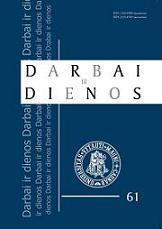Modernybės filosofijos, istorijos pabaiga ir postmodernybės istorija Jono Meko literatūroje ir kine
Jonas Mekas on the philosophy of modernity, the end of history, and the history of postmodernity
Author(s): Ramūnas ČičelisSubject(s): Cultural Essay, Political Essay, Societal Essay
Published by: Vytauto Didžiojo Universitetas
Keywords: Filotopija; Modernybės istorija; Postmodernybės istorija; Kelio chronotopas; Idilinis chronotopas; Philotopy; History of modernity; Histority of postmodernity; Chronotope of the road, Chronotope of the idyll
Summary/Abstract: Straipsnyje nagrinėjama modernybės filosofijos ir istorijos pabaiga Jono Meko literatūroje ir kine. Taip pat straipsnyje kalbama apie postmodernybės istorijos įtaką Meko kinui. Pradedant poezijos rinkiniu „Pavieniai žodžiai“ ir baigiant vienu iš naujausių Meko filmų „Pasaulio prekybos centro haiku“, atskleidžiama, kaip modernybės istorija, kuriai buvo būdingas loginis, priežasties ir pasekmės santykius pabrėžiantis aiškinimas, istorijos kaip nuolatinės pažangos supratimas keičiamas iracionaliu, atsitiktinumu pagrįstu postmoderniosios istorijos įsigalėjimu, dėl kurio tampa svarbi individo ir būties decentracija, asmens primatas prieš masę, kolektyvą. Modernybės filosofijos ir istorijos pabaiga straipsnyje siejama su Antruoju pasauliniu karu ir jo pasekmėmis. Postmodernioji istorija Mekui kaip asmeniui tampa svarbi tik tuomet, kai virsta modernybės istorijos recidyvu – taikiai ir ramiai gyvenantis Mekas apie bendruomeninę istoriją gali leisti sau pamiršti. Straipsnio pabaigoje išvedama, kad modernybės istorijos pabaiga Meko filmuose reiškiama kelio chronotopą keičiant idiliniu chronotopu, kuris rodo jau ne kelione pagrįstą erdvės ir laiko kaitą, o pastoralinį buvimą „čia“ ir „dabar“. Meko literatūrinė kūryba nuosekliai atskleidžia, kaip dėl modernybės istorijos pabaigos įvykių – Antrojo pasaulinio karo – namus praradęs asmuo juos vėl įgauna, filotopiškai pamilsta vietą, kurioje yra. This article analyzes the end of modern philosophy and of history in the books and films of Jonas Mekas as well as the influence of postmodern history specifically on his films. Starting with the poetry collection Pavieniai žodžiai (Solitary Words) and ending with WTC Haikus, one of his most recent films, the analysis shows how modern history, with its conception of history as constantly progressing and explicable by logic in terms of causes and effects, transmutes into postmodern history, with its emphasis on the irrational and the accidental. The end of modern philosophy and of history is associated with the Second World War and its consequences. Postmodern history is personally important to Mekas only insofar as it becomes the dustbin of modern history: living in peace and tranquility, Mekas can afford to forget about the history of the community. In conclusion the author of this article argues that the end of the history of modernity shows up in Mekas‘s films as a switch from the chronotope of the road to that of the idyll: the latter chronotope no longer shows a travel-induced change in space and time but a pastoral way of being here and now. The literary work of Jonas Mekas reveals how a human being who has lost his home due to the events at the end of modernity – the Second World War – regains it by philotopically falling in love with the place where he finds himself.
Journal: Darbai ir dienos
- Issue Year: 2014
- Issue No: 61
- Page Range: 67-99
- Page Count: 33
- Language: Lithuanian

